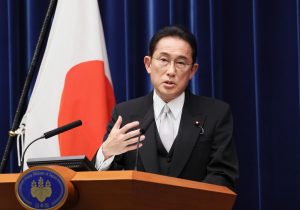Japan’s governing party said Thursday that an internal survey found that nearly half of its national lawmakers had ties to the Unification Church, in a widening controversy that emerged after the assassination of former Prime Minister Abe Shinzo.
Abe was shot to death during a campaign speech in the western city of Nara in July. The suspect, Yamagami Tetsuya, reportedly told police he killed Abe because of his apparent link to the Unification Church. A letter and social media postings attributed to him said large donations by his mother to the church bankrupted his family and ruined his life.
That led to revelations of widespread ties between the governing Liberal Democratic Party and the South Korea-based church, which experts say urges Japanese followers to make large donations to make amends for their ancestral sins, including Japan’s past colonialization of the Korean Peninsula.
LDP Secretary General Motegi Toshimitsu said in the survey, 179 of the 379 party parliamentarians reported links to the church and related organizations. The relationships ranged from attending church events to accepting donations and receiving election support. However, Motegi denied there were any ties between the conservative governing party as an organization and the church.
“I take the results of the party survey seriously,” Prime Minister Kishida Fumio told reporters. “In the future, the party will sever ties to organizations with known social problems and make it a party policy, so we won’t invite suspicion from the public.”
The Unification Church has been accused of inappropriate recruitment and business tactics and of pressuring adherents to make large donations, which the church denies.
Ninety-six of the LDP lawmakers reported attending events organized by the church or its affiliates, while 20 said they had made speeches. Nearly 50 said they paid money at events, while 29 accepted donations. Abe’s younger brother, former Defense Minister Kishi Nobuo, and former Economy and Industry Minister Hagiuda Koichi were among 17 who accepted church followers as election campaign volunteers.
Abe, a conservative nationalist who was one of Japan’s most influential politicians, recorded a video message last year for the Universal Peace Federation, a church-affiliated group, in which he praised federation co-founder Hak Ja Han Moon, who also heads the Unification Church, for her efforts in promoting traditional family values.
Opposition lawmakers criticized the survey for having excluded Abe because he is deceased. The survey also did not include LDP lawmakers in local assemblies, where church followers are also active in influencing policies, critics say.
The Unification Church was founded in South Korea in 1954 and came to Japan a decade later. It has built close ties with LDP lawmakers over shared interests in conservative causes, including opposing Communism. Abe’s grandfather, former Prime Minister Kishi Nobusuke, helped found the church’s political unit in Tokyo in 1968.
Kishida, despite a Cabinet shuffle in August in which he purged seven ministers with acknowledged church links, including Kishi, ended up with more in his new Cabinet.
Support for Kishida’s government has tumbled in recent media surveys, apparently because of party members’ church links and plans for a rare state funeral for Abe.
A family funeral for Abe was held in July at a Tokyo temple, but Kishida wants to hold a state funeral on September 27 at the Budokan martial arts arena with about 6,000 invited guests. The only other state funeral for a former prime minister in recent decades was for Yoshida Shigeru in 1967. It was criticized as having been decided undemocratically and an inappropriate use of taxpayers’ money.
Critics say Kishida’s decision to hold a state funeral for Abe is an attempt to please lawmakers belonging to Abe’s former faction within the governing party to maintain party unity and buttress Kishida’s own grip on power. He has said Abe deserves a state funeral as the longest-serving post-World War II leader and for his diplomatic and economic achievements.
Kishida’s government initially put the funeral cost at 250 million yen ($1.7 million) but recently said it will require at least 1.4 billion yen ($9.7 million) more for security, transportation, and hospitality for foreign dignitaries and other guests. Some say the cost could further increase.

































